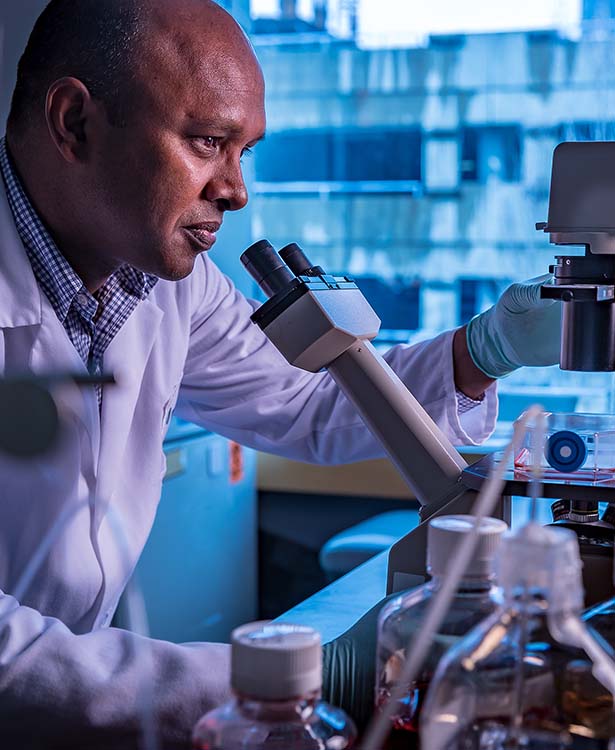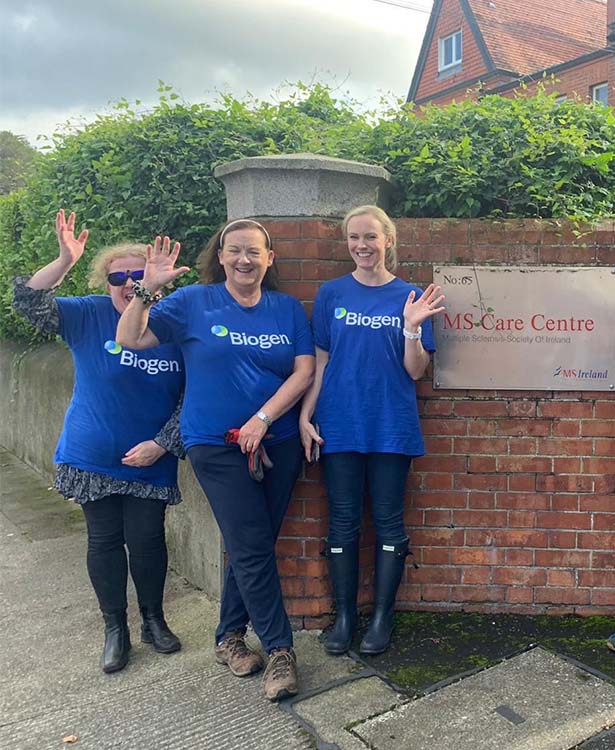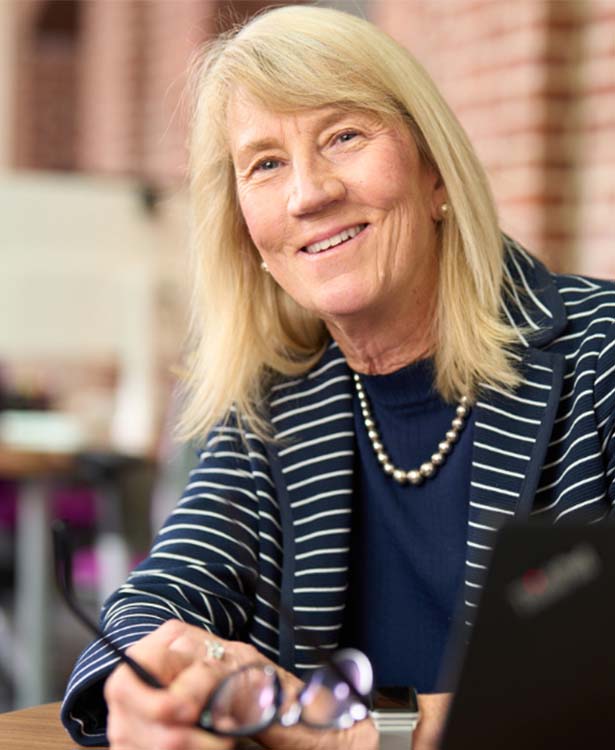Over the last six decades, only three drugs to treat lupus have been approved in the U.S.1 despite the fact that as many as 5 million people globally live with a form of the serious autoimmune disease.2
Lupus disproportionately impacts young women of child-bearing age and, in particular, women of color.3,4,5,6,7 Dr. Youmna Lahoud recalls feeling helpless as a practicing rheumatologist that she didn’t have a more diverse therapeutic toolbox to help her patients who had run out of treatment options.
Dr. Lahoud, on staff at Boston Medical Center for nearly a decade, reached a career tipping point in 2021 and joined Biogen’s growing team of pioneering scientists and researchers focused on developing potential new therapies for lupus in the hopes of offering more options to the medical community. Decades of study and industry-shaping innovation in neuroimmunology and immunology have given Biogen deep insight to understand multiple modalities targeting immune cell pathways anticipated to modulate the disease.
Lupus has long been a challenging target due to the complexity of the disease and the heterogeneity of its presentation. Systemic lupus erythematosus (SLE), the most common form of the condition, can affect a person's joints, skin, brain, lungs, kidneys and blood vessels.8
For others, lupus is a “hidden” disease whose symptoms can be difficult to recognize. For example, chronic fatigue, severe pain episodes, body aches and sun sensitivity are all ways lupus can impact a person’s health without making them appear overtly sick.9
The complexity of lupus has also made it difficult to identify appropriate endpoints for clinical trials. The dearth of innovation for more than a half-century is due, in part, to the difficulty in demonstrating statistically significant improvement in a disease where symptoms are so variable.10
“Lupus is complex, but so is our approach to treating it,” says Diana Gallagher, MD, Head of AD, MS and Immunology Development Units at Biogen. “Biogen is developing multiple therapies with the potential to tackle lupus from all angles. We're not settling for a single potential solution because we believe that with the right building blocks, we can offer a better future for everyone affected by lupus.”
Research breakthroughs in recent years have created unprecedented momentum and optimism. More than 100 autoantibodies have been identified in lupus, opening up promising new R&D pathways to potentially deliver precision therapeutics.11
Diana Gallagher, MD, Head of AD, MS and Immunology Development Units at Biogen.
Biogen is working to deliver the industry’s first lupus franchise, addressing different forms of lupus, such as SLE and cutaneous lupus erythematosus (CLE) with multiple investigational drugs in clinical trials.
Given the broad symptoms, presentation and severity of lupus, having multiple potential approaches to addressing the disease may give doctors the opportunity to individualize how they treat people living with the disease. Biogen scientists are working to innovate against lupus from multiple research directions.
“The closer we get to reaching our goals,” Dr. Gallagher says, “the greater our responsibility is to this community whose needs have remained unmet for too long.”
A Commitment to Clinical Access and Equity
Although anyone can develop lupus, an estimated 90 percent of people living with lupus are women; most begin to see symptoms between the ages of 15 and 55,3, 4, 5 when many are building careers and considering having children and growing their family.6, 7
Historically, clinical trial recruitment has been challenging, due in part to legacies of medical mistrust and other social determinants of health. People from underrepresented communities experience doubt in their symptoms or denied care when in the midst of severe lupus pain episodes.12 Further magnifying inequities is that many lupus trial centers are not located within communities most affected by the disease, leading to a lack of awareness and access.13, 14 Determined to rebuild that trust with a long under-served population, Biogen is working to enroll trials that reflect the diversity of lupus and mirror real-world prevalence rates in its study participants.
Biogen is staffing clinical trials with members of affected communities and investing in education and support programs focused on delivering culturally competent care.
And, recognizing that clinical study participation can be logistically and financially challenging for people in high-prevalence communities, Biogen is offering new types of non-medical support to assist with clinical trial access, including free childcare for eligible individuals and identifying trial sites using multiple data sources in zip codes with high SLE and CLE prevalence.
“We’re as focused on innovative solutions in the clinic as we are in the lab,” says Adam Meyers, Head of Immunology and New Disease Areas at Biogen. “It’s all part of our determination to work to develop new ways to reach people who are depending on us the most.”
1 Katarzyna PB, Wiktor S, Ewa D, Piotr L. Current treatment of systemic lupus erythematosus: a clinician's perspective. Rheumatol Int. 2023 Aug;43(8):1395-1407.
2 Pons-Estel GJ, Alarcón GS, Scofield L, Reinlib L, Cooper GS. Understanding the epidemiology and progression of systemic lupus erythematosus. Semin Arthritis Rheum. 2010 Feb;39(4):257-68.
3 Petri M. Epidemiology of systemic lupus erythematosus. Best Pract Res Clin Rheumatol. 2002;16(5):847-58.
4 Rees F, Doherty M, Grainge M, Davenport G, Lanyon P, Zhang W. The incidence and prevalence of systemic lupus erythematosus in the UK, 1999-2012. Ann Rheum Dis. 2016;75(1):136-41.
5 Pons-Estel GJ, Ugarte-Gil MF, Alarcón GS. Epidemiology of systemic lupus erythematosus. Expert Rev Clin Immunol. 2017;13(8):799-814.
6 Carter EE, Barr SG, Clarke AE. The global burden of SLE: prevalence, health disparities and socioeconomic impact. Nat Rev Rheumatol. 2016;12(10):605-20.
7 Kheir JM, Guthridge CJ, Johnston JR, Adams LJ, Rasmussen A, Gross TF, et al. Unique clinical characteristics, autoantibodies and medication use in Native American patients with systemic lupus erythematosus. Lupus Sci Med. 2018;5(1):e000247.
8 Tselios K, Gladman DD, Touma Z, et al. Disease course patterns in systemic lupus erythematosus. Lupus. 2019;28(1):114-122.
9 Fanouriakis A, Tziolos N, Bertsias G, et al. Update οn the diagnosis and management of systemic lupus erythematosus. Ann Rheum Dis. 2021;80(1):14-25.
10 Mahieu MA, Strand V, Simon LS, Lipsky PE, Ramsey-Goldman R. A critical review of clinical trials in systemic lupus erythematosus. Lupus. 2016 Sep;25(10):1122-40.
11 Yaniv G, Twig G, Shor DB, Furer A, Sherer Y, Mozes O, Komisar O, Slonimsky E, Klang E, Lotan E, et al. : A volcanic explosion of autoantibodies in systemic lupus erythematosus: a diversity of 180 different antibodies found in SLE patients. Autoimmun Rev 2015, 14:75–79.
12 FitzGerald C, Hurst S. Implicit bias in healthcare professionals: a systematic review. BMC Med Ethics. 2017;18:19. doi: 10.1186/s12910-017-0179-8.
13 Sheikh SZ, Wanty NI, Stephens J, Holtz KD, McCalla S. The state of lupus clinical trials: minority participation needed. J Clin Med 2019;8:1245.
14 Arriens C, Aberle T, Carthen F, Kamp S, Thanou A, Chakravarty E, James JA, Merrill JT, Ogunsanya ME. Lupus patient decisions about clinical trial participation: a qualitative evaluation of perceptions, facilitators and barriers. Lupus Sci Med. 2020 Mar 15;7(1):e000360.





